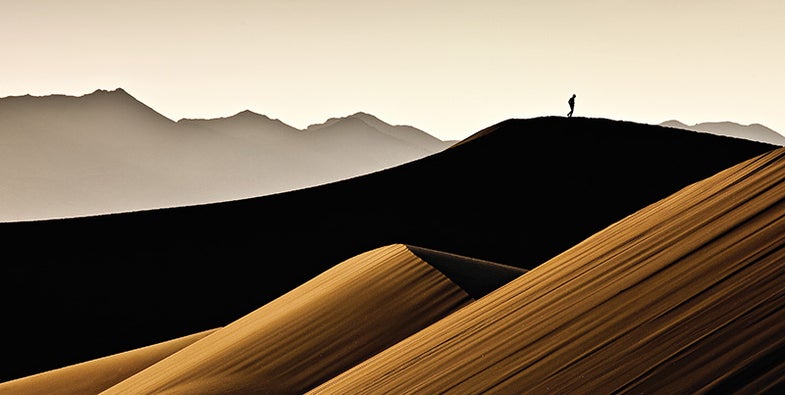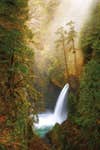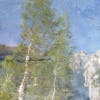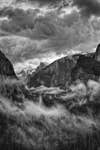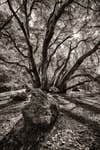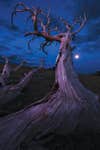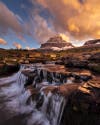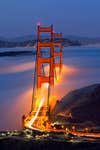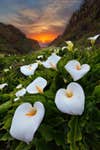Classic View: Metlako Falls
Though his own vast homeland offers lots of eye-popping topography, that hasn’t stopped Australian photographer Jarrod Castaing from exploring America’s iconic Western landscape. But Castaing doesn’t fall back on the sharp-edged modernism of such West-loving greats as Ansel Adams and Edward Weston. Consider his photograph of Metlako Falls, highest on the Columbia River Gorge’s Eagle Creek, made on an icy winter day from the edge of a steep cliff. The pictorialist approach lends the scene a sense of tranquility, due to the detail-softening, light-diffusing mist, and his use of a water-blurring eight-second exposure. Castaing’s framing of the falls with the surrounding trees and rocks gives his image an unexpected intimacy.
My USA: Oregon
As a commercial airline captain, Miles Morgan sees much of America from miles high. But Morgan’s love of photography, inspired by his photojournalist father, keeps him grounded—here, in a field of purple penstemon and flaming-red Indian paintbrush erupting from soil enriched by ash from distant Mount St. Helens, the infamously active volcano not far from his home in Portland, Oregon. Nature contributed her own electricity to his surging near-far composition. “The weather was a surprise,” says Morgan, who had never tried to include lightning in a photograph before. “Thunderstorms are relatively rare in this part of the country, particularly in the morning. I got lucky.”
Urban Landscape: Lake Michigan, Chicago
Although british lensman Adrian Almond has taught geography and geology for many years—and lives in England’s fabled, lushly pastoral Lake District—his dynamic shot of metal canoes was made in America’s urban heartland. The subject, a sculpture on Chicago’s Lake Michigan shoreline, offered Almond a wealth of angular shapes and lines not ordinarily found in nature. To make sure every rod and rivet was tack-sharp, Almond locked up the mirror on his tripod-mounted EOS 5D Mark II, setting his Canon EF 28-70mm f/2.8L zoom to a near-normal 64mm. “I was attracted by the warm morning light blending in with the cool, stark tones of bright aluminum,” he says. “I love the fine detail in the scratched metal and cabling.”
Landscape on the Move: Yellowstone National Park
When she’s home in Britain, photographer Claire Onions loves to shoot the timeworn Jurassic-era cliffs that line the English Channel near her residence in Dorset. She has voyaged several times, though, to the New World’s Yellowstone National Park, where a sharp-eyed observer can find rock outcroppings ten times older. For this dreamy shot of the park’s Merced River, it was the agent of that erosion—moving water—that caught her eye. “I’d left my SLR in the car,” says Onions, who captured this pastel reflection of trees and shoreline rocks with the Panasonic Lumix DMC-TZ8 compact that was, fortunately, in her pocket. “It wasn’t until later that I realized it was the photographic equivalent of a Monet painting.” To that effect, Onions chose to flip the original image upside-down before sending it in.
Overall Youth Winner: Yosemite National Park
This year’s Young USA Landscape Photographer of the Year relied on some time-honored wisdom. Three years ago, Vincent Bonafede’s father said he would get him his own camera if he made a promise: to shoot only in manual mode. That deal has helped teach Bonafede, now 14, more about the nuts and bolts of photography than many auto-only shooters manage to learn in decades. He hones those skills on trips with his father to one of landscape photography’s American meccas, Yosemite National Park. But his view of the park’s famous valley, with Half Dome in the distance (far left), has a tonal range that Ansel Adams would have struggled to achieve chemically—the result of combining bracketed exposures in Nik HDR Efex Pro software. Bonafede then converted the high-dynamic-range image to black and white. “We stopped at Tunnel View just as a large storm was clearing,” he recalls. “There were clouds over us and mist coming up the valley. It reminded me of an Ansel Adams photograph I’d seen, and I wanted to create an image that made me feel the same way.”
Overall Youth Winner: Sierra Nevada Mountains, California
Vincent Bonafede doesn’t always go for the grand view, as evidenced by his image of splayed tree trunks, mossy boulders, and a leafy canopy (left), all suffused in backlight that he tamed with HDR technique. For this shot, Bonafede discovered his bucolic subject in the western slope of California’s Sierra Nevada mountain range.
Black & White: New York City
New York City presents an ever-changing human landscape, as U.K.-based wedding photographer Nicholas Hill discovered on a recent stroll down Manhattan’s famous Fifth Avenue. “The glass structures of the Apple Store intrigued me enough to go inside,” says Hill, who’s as comfortable shooting city streets as he is capturing the raw natural beauty of Scotland, Norway, and Iceland. Just as the store’s security personnel descended on him, he noticed how the translucent landing of its interior’s trademark glass staircase turned striding figures into soft, abstract shapes—and quickly aimed his Canon EOS 5D Mark III and EF 15mm f/2.8, a full-frame fisheye lens, at the underside. Hill captured both the soles of customers and the soaring towers of midtown Manhattan, making a visual connection that elevates his picture from good to great.
Overall Adult Winner: Glacier National Park
Set on the spine of the Rocky Mountains, Glacier National Park’s geologic gems—plus a mountain of talent—garnered Nagesh Mahadev this year’s USA Landscape Photographer of the Year Award. A resident of Lewisville, TX, Mahadev shot each of his three winning images in the Montana park, where the play of light on peaks and valleys is “mesmerizing,” to use his word. “I was introduced to a world I hadn’t been privy to,” he says. “Colors became livelier, and I began to see shapes and textures I’d hardly noticed before.” His low-light image of a ghostly pine tree (bottom right) is a case in point. Mahadev’s canny combination of a low point of view, a wide-angle lens (Nikon’s 16–35mm f/4G at 16mm), and separate exposures for tree and night sky conjure an ominous mood.
Overall Adult Winner: Glacier National Park
In this late-day image of snow runoff with cloud-shrouded Mt. Reynolds in the distance a slow shutter speed of 1/3 sec gave the water its movement—keeping the viewer’s attention focused on layers of ancient rock.
Overall Adult Winner: Glacier National Park
In Mahadev’s view of the valley below Logan Pass, he enhances the high dynamic range with two exposures bracketed with a change in ISO. The shapes formed by upended sedimentary slabs echo the slant of the rising sun’s rays, an effect buttressed by the golden wedge of trees at the center of the image.
Judge’s Choice: Death Valley, California
The dunes of California’s Death Valley seem formed by etched lines rather than windblown sand in this late-afternoon photo-graph by Samuel Feron of the hottest place on Earth. But Frenchman Feron got fired up about photography in that clime’s antithesis, frosty Iceland. Both places satisfy Feron’s passion for the pristine—landscapes offering spectacular forms that invite him to break the rules of traditional composition. For his winning shot, Feron waited for the walking figure to reach the top of the dune. “It would have been the classical thing to compose with more empty space in front of him instead of behind,” Feron observes. “But because he seemed lost in thought, I wanted to create mystery by cropping out the area he’s walking toward.”
Highly Recommended: San Diego
San Diego
Highly Recommended: Chicago
Chicago
Highly Recommended: Santa Fe Mountians, New Mexico
Santa Fe Mountians, New Mexico
Highly Recommended: San Francisco
San Francisco
Highly Recommended: Paradise Cove
Paradise Cove
Highly Recommended: Alaska
Alaska
Highly Recommended: New York City
New York City
Highly Recommended: San Francisco
San Francisco
Highly Recommended: Shiprock, New Mexico
Shiprock, New Mexico
Highly Recommended: New York City
New York City
Highly Recommended: San Francisco
San Francisco
Highly Recommended: Death Valley, California
Death Valley, California
